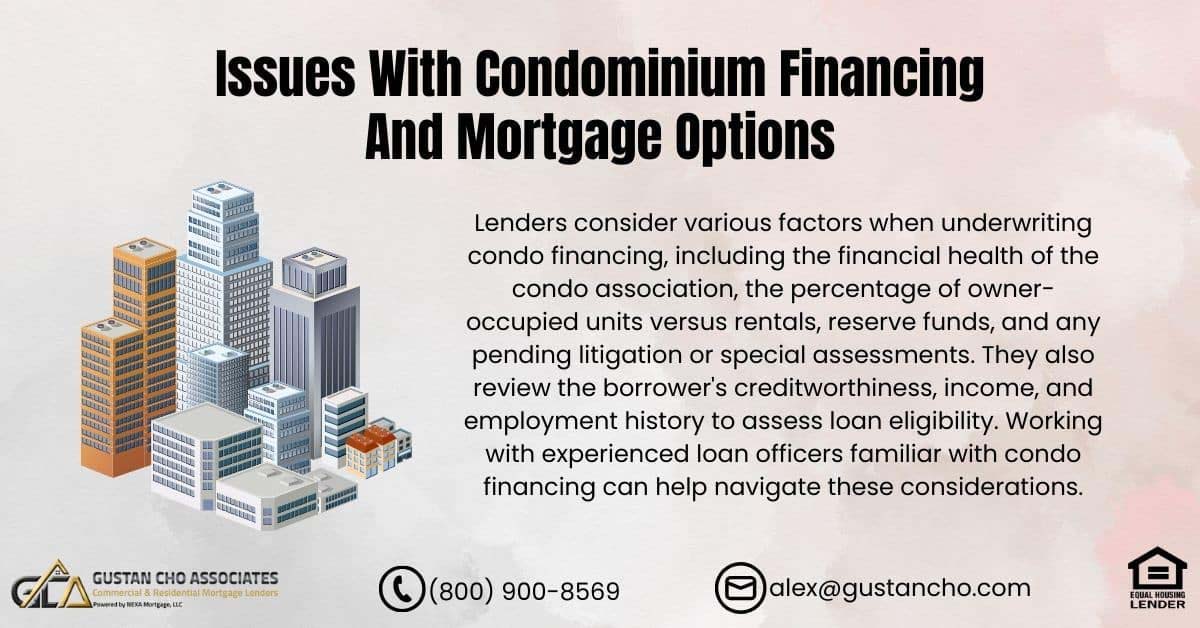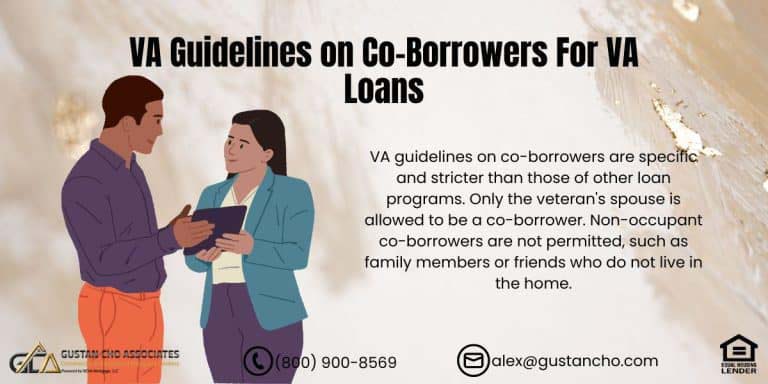Issues With Condominium Financing And Mortgage Options in 2024
Financing a condominium can be a smart choice for many buyers. Condos often offer a mix of affordability and convenience. Still, getting a mortgage for one can come with unique challenges. At Gustan Cho Associates, we’re experts in helping buyers navigate the issues with condominium financing, ensuring that you’re fully prepared to get the best possible loan for your condo purchase.
If you’re considering buying a condo or refinancing one, this guide will explain the common problems, how to solve them, and what to expect in 2024. Let’s get started!
Why Is Condo Financing Different From Single-Family Homes?
One of the biggest issues with condominium financing is that lenders often view it as riskier than single-family homes. This is due to several factors:
- Condo Associations – Lenders must evaluate the financial health of the entire condo association, not just your personal finances.
- Owner-Occupancy Rates – The percentage of owner-occupied units vs. rentals can affect your loan options.
- Reserve Funds – Lenders want to ensure the association has enough reserves set aside for major repairs.
Because of these added layers of risk, some lenders have stricter requirements for condos. But don’t worry—Gustan Cho Associates is here to help you overcome these challenges and find the loan that fits your needs.
Looking to Buy a Condo? Explore Your Financing and Mortgage Options Today!
Contact us today to find the best mortgage option for your condo and get pre-approved!
Challenges with FHA Loans and Condo Financing
Many buyers look to FHA loans when purchasing a condo because of the low down payment options and flexible credit score requirements. However, not all condo complexes are eligible for FHA financing.
The condominium complex must be listed on the HUD Approved Condo List to be eligible for an FHA condo loan. If the FHA does not approve the complex, you will have to consider alternative options such as conventional loans or portfolio loans.
What If My Condo Isn’t FHA-Approved?
If you’re set on buying a condo that isn’t FHA-approved, it’s not the end of the road. You may qualify for:
- Conventional Loans – These loans have stricter requirements but offer competitive rates.
- Portfolio Loans – These loans don’t conform to standard lending guidelines. They are typically offered by smaller banks and credit unions, with options for non-warrantable condos.
Non-warrantable condos are those where over 51% of the units are rented or investor-owned. This makes them riskier in the eyes of traditional lenders, but portfolio loans can be a great alternative. You may need a down payment of 20% or more, but we can help you find the best financing options.
What Makes a Condo Warrantable vs. Non-Warrantable?
Understanding whether your condo is warrantable or non-warrantable is key in financing. Here’s a quick breakdown:
- Warrantable Condos—These condos meet the criteria Fannie Mae and Freddie Mac set. For a warranty to be valid, more than half of the units must be occupied by their owners, and no single owner can possess more than 10% of the units. These condos qualify for conventional loans.
- Non-Warrantable Condos—If a condo doesn’t meet the criteria for warrantable status, it’s considered non-warrantable. This usually happens when more than half of the units are rented out, or the condo has ongoing legal or financial issues. Non-warrantable condos require alternative financing, like portfolio loans.
At Gustan Cho Associates, we specialize in both warrantable and non-warrantable condo financing, ensuring that we can find the best loan for you, no matter your situation.
Common Issues With Condominium Financing
When financing a condo, it’s important to understand some of the most common issues you might face. Knowing these issues ahead of time can save you a lot of frustration.
1. Condo Association’s Financial Health
Lenders will review the condo association’s financials to ensure they’re well-managed. If more than 15% of condo owners are behind on their HOA dues, or if the association doesn’t have at least 10% of their income set aside in reserve funds, securing financing can be tough.
The reserve funds are essential for covering major repairs like roof replacement, window updates, or parking lot fixes. The lender may view the complex without enough reserves as a financial risk.
2. Pending Litigation
Lenders may decline your loan application if the condo complex is involved in any legal disputes. Pending litigation can be a red flag that the property or association could face financial or structural issues down the line.
3. Mixed-Use Condos
If your condo is part of a mixed-use development (like a building with retail stores on the ground floor and residential units above), your financing options may be limited. Many lenders won’t finance mixed-use condos unless the commercial space makes up 20% or less of the building.
4. Higher Down Payments
For many condos, lenders require larger down payments compared to single-family homes. This is especially true for non-warrantable condos, where a 20% down payment may be required.
Condo Mortgage Rates: What You Need to Know
Interest rates for condo loans can be slightly higher than those for single-family homes. This is because lenders consider condos to be riskier, as mentioned earlier. The good news is that you can still secure competitive rates with the right preparation.
At Gustan Cho Associates, we work with a wide range of lenders to help you find the best rates and terms for your condo loan, whether you’re buying a primary residence, second home, or investment property.
How Does Monthly Amortization Work for Condos?
When financing a condo, your monthly mortgage payment (also known as amortization) will include:
- Principal and Interest—The principal is the amount you borrow, and the interest is what you pay the lender for borrowing the money.
- Property Taxes and Insurance—Most lenders require that you escrow (set aside) money for property taxes and insurance.
- HOA Fees – Condo owners are also responsible for monthly homeowners association fees. These cover maintenance of common areas, repairs, and amenities like swimming pools or gyms.
By understanding these costs upfront, you can better plan your budget and avoid surprises.
Steps to Successfully Finance a Condo
Here are the steps you can follow to ensure smooth condo financing:
- Get Pre-Approved: Before you start shopping for a condo, get pre-approved for a loan. This will help you understand what you can afford and ensure no surprises later in the process.
- Work with a Specialist: Not all loan officers are familiar with condo financing. Make sure you work with someone with experience in this area, like our team at Gustan Cho Associates. We’ll guide you through the process and help you avoid potential roadblocks.
- Understand the Condo Association’s Rules: Review the association’s rules and financials before making an offer on a condo to ensure they meet your lender’s requirements.
- Submit a Strong Offer: Once you’ve found the perfect condo, submit a competitive offer. Be prepared to move quickly, as condos in desirable areas can sell fast.
- Close the Deal: After your offer is approved, you’ll collaborate with your lender to complete the loan process. We’ll manage all the documentation and ensure a seamless closing process.
Ready to Own a Condo? Let’s Explore Your Financing Options Together!
Reach out now to learn about your mortgage options and get started on your condo purchase.
Updates for Condo Financing in 2024
As of 2024, several important updates have impacted the condo financing landscape:
- Tighter Lender Requirements—Due to increased market risks, lenders are scrutinizing condo associations more closely. This means that having solid reserve funds and a low percentage of delinquencies is more important than ever.
- More Flexible Portfolio Loans – Portfolio loans for non-warrantable condos have become more flexible in recent years. If you’re buying a non-warrantable condo, these loans can be a great option instead of traditional financing.
- Increased Interest in Mixed-Use Properties – While mixed-use condos have historically been harder to finance, some lenders now offer special programs for these properties, particularly in urban areas.
At Gustan Cho Associates, we keep up with the most recent developments and changes in condo financing so that you receive the most favorable loan.
Get Expert Help with Condo Financing Today
Whether you’re purchasing a condo or refinancing one, working with a team that understands the unique challenges of condo financing is important. At Gustan Cho Associates, we specialize in warrantable and non-warrantable condo financing. Our knowledgeable mortgage specialists will assist you in addressing the challenges related to financing a condominium and locating the most suitable loan for your requirements.
Ready to get started? Contact us today at 800-900-8569 or email us at alex@gustancho.com to see how we can help you finance your dream condo.
Related> Condominium mortgage loans
Frequently Asked Questions About Issues With Condominium Financing:
Q: Why is Financing a Condo Different from Buying a House?
A: Financing a condo can be trickier because lenders see condos as riskier investments. This is one of the main issues with condominium financing. They look closely at the condo association’s finances and the number of owner-occupied units.
Q: What are Common Issues with Condominium Financing?
A: Common problems include stricter lender requirements, higher down payments, and challenges if the condo association needs to be financially healthy. These are typical issues with condominium financing that borrowers face.
Q: Can I Get an FHA Loan for Any Condo?
A: Not necessarily. The condo must be on the HUD Approved Condo List for an FHA loan. If not, you’ll encounter issues with condominium financing using an FHA loan.
Q: What if the Condo I Want Isn’t FHA-Approved?
A: If the condo isn’t FHA-approved, you might still get a conventional or portfolio loan. However, you may face some issues with condominium financing and might need a larger down payment.
Q: What’s the Difference Between warrantable and Non-Warrantable Condos?
A: Warrantable condos meet certain criteria Fannie Mae and Freddie Mac set, making them easier to finance. Non-warrantable condos don’t, leading to issues with condominium financing and the need for special loan options.
Q: Why Do Lenders Care About the Condo Association’s Finances?
A: Lenders review the association’s finances to ensure it’s well-managed and financially stable. Problems like high delinquency rates in HOA dues can cause issues with condominium financing.
Q: Do I Need a Bigger Down Payment for a Condo?
A: Often, yes. Lenders may require a larger down payment for condos, especially non-warrantable ones. This is a common issue with condominium financing.
Q: Are Interest Rates Higher for Condos?
A: Condominiums can have slightly higher interest rates because lenders view them as riskier. This is another issue with condominium financing to consider.
Q: Can I Finance a Condo in a Mixed-Use Building?
A: It can be more challenging. Many lenders will not finance condos in buildings with commercial space exceeding 20%, which can lead to issues with condominium financing for mixed-use properties.
Q: How Can Gustan Cho Associates Help Me with Condo Financing?
A: We specialize in both warrantable and non-warrantable condo financing. Our team understands the issues with condominium financing. It can guide you through the process to find the best loan for your situation.
This blog about “Issues With Condominium Financing And Mortgage Options” was updated on October 1st, 2024.
Ready to Buy a Condo? Let’s Find the Best Mortgage Option for You!
Contact us today to discuss your condo financing options and get pre-approved for your loan.









